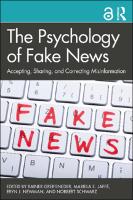The Psychology of Fake News
Accepting, Sharing, and Correcting Misinformation
Contributor(s)
Greifeneder, Rainer (editor)
Jaffe, Mariela (editor)
Newman, Eryn (editor)
Schwarz, Norbert (editor)
Collection
Swiss National Science Foundation (SNF)Language
EnglishAbstract
This volume examines the phenomenon of fake news by bringing together leading experts from different fields within psychology and related areas, and explores what has become a prominent feature of public discourse since the first Brexit referendum and the 2016 US election campaign. Dealing with misinformation is important in many areas of daily life, including politics, the marketplace, health communication, journalism, education, and science. In a general climate where facts and misinformation blur, and are intentionally blurred, this book asks what determines whether people accept and share (mis)information, and what can be done to counter misinformation? All three of these aspects need to be understood in the context of online social networks, which have fundamentally changed the way information is produced, consumed, and transmitted. The contributions within this volume summarize the most up-to-date empirical findings, theories, and applications and discuss cutting-edge ideas and future directions of interventions to counter fake news. Also providing guidance on how to handle misinformation in an age of “alternative facts”, this is a fascinating and vital reading for students and academics in psychology, communication, and political science and for professionals including policy makers and journalists.
Keywords
Psychology; Social, group or collective psychologyDOI
10.4324/9780429295379Publication date and place
2021Imprint
RoutledgeClassification
Psychology
Social, group or collective psychology


 Download
Download